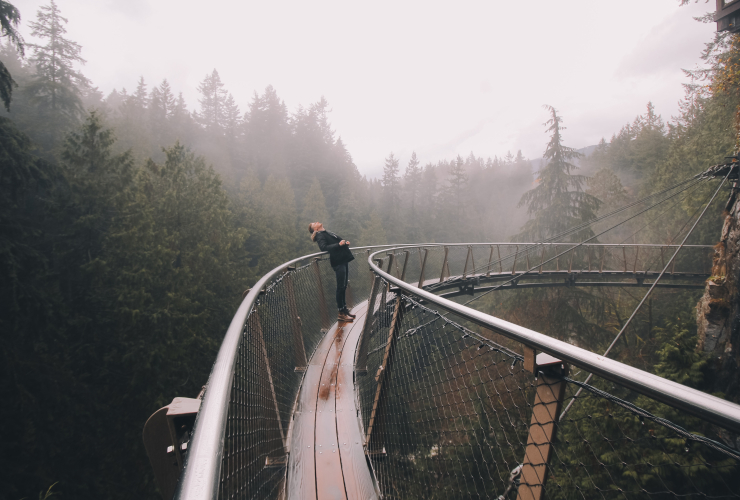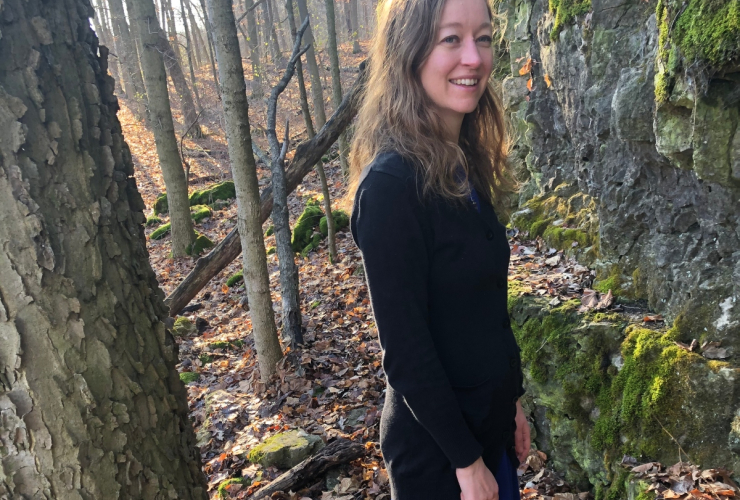Madyson Adams’ day job is providing decision-makers in Surrey, B.C., with information to protect and enhance salmon and their habitats. By helping the community’s 600,000 residents co-exist with salmon, she is restoring and building resilience in ecosystems across the second-most populous municipality in the province. Adams also works part-time as the operations co-ordinator for the Society Promoting Environmental Conservation.
This piece is part of a series of profiles highlighting young people across the country who are addressing the climate crisis. These extraordinary humans give me hope. I write these stories to pay it forward.

Tell us about your job at Surrey.
At present, I map overlaps between city infrastructure and salmon habitat. This ensures construction projects protect, restore or replace it with similar topography and micro-climatic conditions. I also map undeveloped spawning or rearing salmonid habitat that enables my colleagues to make recommendations for adaptations to allow fish to thrive in urban environments. In the past, I co-ordinated community volunteers engaged in restoring and enhancing salmonid habitat and assisted with preventing erosion and sediment from construction sites to run off into urban streams.
One of my favourite experiences was helping Surrey families draw awareness to the presence of salmon in the water channels under their own built environment. Surrey residents have painted 1,200 storm drains with yellow salmon as a reminder to city folk that the way we use our drains impacts wildlife.
Salmon are a keystone species, so when we look after them, we are caring for the other wildlife in these ecosystems ranging from plant life, insects, amphibians, birds to coyotes, foxes and raccoons. Resilient ecosystems support human health in so many ways, providing shade and shelter in extreme weather to mitigating flooding and discouraging fires.
People in British Columbia can now get a doctor’s prescription to use provincial parks because time in nature is an evidence-based way to improve mental health. I like knowing that my work helps keep wild spaces close to home for people in Surrey.

What are your responsibilities at SPEC?
I help volunteers find a home to help with food security, zero waste or decarbonizing energy and transportation. I also help source grants and manage some of our databases.
What makes your jobs hard?
I am given a lot of responsibility and often not a lot of direction. I am grateful for the trust in me, but sometimes, it is not very comfortable. I know that this is how I grow and I have learned it is fine for me to admit that I might not know the best steps to take and ask for guidance.
I have 1.5 full-time jobs because they are both so important to me that I couldn’t bear to let one go when I started the other. Sometimes there are not enough hours in the day. But I am learning discipline and know that it is important I take downtime on my scheduled days off.
How did the way you were raised influence your career decisions?
My mom is very compassionate and easygoing. She supports my decisions. My father spent his childhood playing in the tropical rainforests of Trinidad and came to Canada in 1974. He got a degree in computer science and worked for IBM. He was always chasing his next dream — his big idea that would launch him into riches and success. In 2013, he moved back to Trinidad and that’s where he found true riches. He built a house on land given to his forebears with the abolition of slavery and immersed himself in the rainforest, living off the grid. He taught me the importance of place and respect for the land and inspired me to claim these islands as my own home, too. He taught me that being connected to a place that feels like home in your bones is the richest success of all. I am continuing his legacy of making our little slice of Trinidad a paradise.

What worries you?
The size and urgency of the climate crisis are daunting. I try not to run away from my fears and instead lean into them so I can understand where my passion for action lies. If I am passionate, I will work hard and do my very best and that is how to make a real difference.
What gives you hope?
Smart, values-based, mission-driven people exploring human ingenuity. I believe we will find wonderful solutions and life will be much better.
What would you like to say to other young people?
Don’t give up. Believe in your dreams. You may have to experience discomfort along the way, but that is where we learn. There is a more highly evolved you waiting on the other side of the roadblock you now see as insurmountable.
What about our older readers?
Thank you for your wisdom in laying the foundation for the work my generation must do. Thank you for teaching us to admit our mistakes and see them as opportunities for building a better future.






Comments